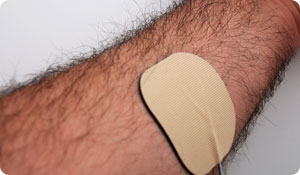
If you are someone who suffers from chronic pain--whether it is back pain, fibromyalgia, arthritis, sciatica, headaches, shoulder, elbow, or knee pain--you are probably not only tired of the pain, but also tired of being dependent on painkilling drugs just to feel like you can make it through the day. If you are looking for alternatives for pain relief, you might consider incorporating a TENS unit into your pain relief program.
TENS stands for Transcutaneous Electrical Nerve Stimulation. A TENS unit is a small device designed for the application of electrical current through the skin for pain relief. Electrodes are placed on the skin, either directly over the painful area or more commonly, at key points along the nerve pathway. The device is adjustable to how fast, how frequent, and how many electric impulses are transmitted, and the pain relief can last from hours to days.
How TENS relieves pain is debated. The sensation produced by the electrical stimulation appears to "override" the pain messages and may stimulate the body to produce endorphins, its own natural morphine-like substance, which minimizes pain.
Whether the electric current aborts pain messages, causes the body to produce pain-relieving chemicals of its own, or if TENS merely has a placebo effect, it relieves pain for a number of people who try it.
While TENS works for many people, it's important to point out that the treatment doesn't work for everyone. For some pain sufferers, TENS doesn't completely relieve their pain, but it reduces their pain level and the amount of pain medication they need.
Is TENS Right for You?
- The first step to take is to talk to your doctor about using TENS for your pain relief. Ask about how it can best be integrated into your pain relief program.
- Next, ask your doctor for a recommendation on what kind of TENS you should purchase. The cost of a TENS unit ranges from under 100 dollars to several hundred dollars. The most expensive ones offer a large number of different modes, and the most basic units only have one mode. Get your doctor's opinion on which is best suited to your condition.
- Then, get instruction from your doctor about the proper placement of electrodes, the control settings, and the length of time you should use TENS for your particular situation.
- Finally, try it! TENS is non-addictive, causes no drowsiness, and can be used indefinitely without the problems associated with prolonged drug use. It may be just the thing that gives you the relief that you seek.
Sources
Chang-Miller, A. TENS therapy: An option for fibromyalgia treatment? MayoClinic.com. http://www.mayoclinic.com/health/tens/AN01946. Accessed 16 Mar. 2010.
Mayo Clinic Staff. Postherpetic Neuralgia. MayoClinic.com. http://www.mayoclinic.com/health/postherpetic-neuralgia/DS00277/DSECTION=treatments-and-drugs. 16 Mar. 2010.
St. John, B. Alternative for Chronic Pain Sufferers - the TENS unit. http://www.associatedcontent.com/article/358594/alternative_for_chronic_pain_sufferers.html?cat=5. 16 Mar. 2010.
"TENS Therapy." Health Encyclopedia - Diseases and Conditions. USA Today. http://www.healthscout.com/ency/68/240/main.html. 16 Mar. 2010.
Transcutaneous electrical nerve stimulation (TENS) . MayoClinic.com. http://www.mayoclinic.com/health/medical/IM02415. 16 Mar. 2010.





